#support struggles
Explore tagged Tumblr posts
Text


The support struggle is real xD
14 notes
·
View notes
Text
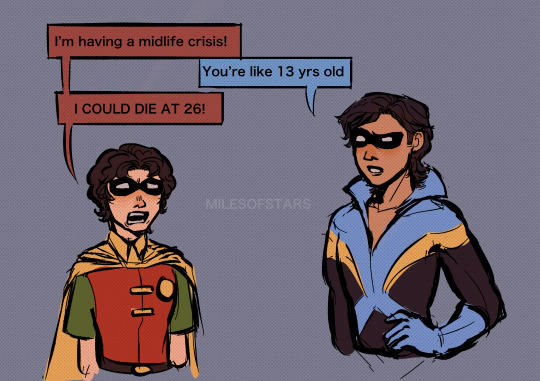
dont worry about it jason...
#im trying to figure out how to draw them#the brothers ever#jason todd#robin jason todd#discowing#dick grayson#if i get even one negative comment about the discowing suit youre all going in the blender#no.1 discowing supporter#batfamily#batman#dc comics#they are so brothers you cant tell me otherwise#i struggled with this help me#expect more art if i can GET MY SHIT TOGETHER#jason todd robin#my art#dc art#this might have been based on an incorrect quotes generator but SHHH
13K notes
·
View notes
Text
many autistic people need people use simpler words when talking to them
many autistic people need tasks broken into tiny steps to understand how do something
many autistic people need positive feedback in way that other think condescending
many autistic people childish and have childish interests
many autistic people have to always be supervised never alone because of risk of hurt self or get in dangerous situations
many autistic people have violent messy big meltdown, even in public
many autistic people struggle with speech always will maybe rest of life (non verbal, semi verbal, demi verbal etc.)
AND most of these autistic people higher support needs + level 2 & 3 autism, don’t forget or ignore us. can’t say “that not true just stereotypes” when it just symptom and sign of higher support needs higher level autism.
you want to raise awareness for lower support needs level 1 autism and yes good ok!!!! but not this way where throw HrSN level 2+3 autistic under bus.
- winnie
#written with aac#actually autistic#higher support needs#higher needs autism#level 2 autistic#level 2 autism#moderate autism#msn autism#msn autistic#moderate support needs#medium support needs#mid support needs#severe autism#level 3 autistic#level 3 autism#level 2 asd#autism level 2#high support needs#hsn#hsn autistic#hsn autism#hrsn autism#hrsn autistic#nonverbal autism#semiverbal autistic#demiverbal#autism acceptence month#autism spectrum disorder#autism struggles#autism acceptance
2K notes
·
View notes
Text
I am not saying here's a link to a free online version of the 1984 graphic novel but if it was there you should probably go read it.
#i just finished it and i want a physical copy now it was so good#i remember i had struggled a bit with the original novel because it felt a bit slow and i think my translation wasn't the best#but this version is super powerful thanks to the illustrations#and since there's the visual support i feel like all the writing is even more punchy because it's really concentrated#so every page is a punch in the guts#if you loved the novel you should read this version and if you didn't like the novel you should read this version even more#great way to make a potentially scary classic more approachable#go read it#book#books#bookblr#booklr#1984#george orwell#distopia#classics#politics#free books
2K notes
·
View notes
Text
also in regards to that last article about varied ways of thinking about psychosis/altered states that don't just align with medical model or carceral psychiatry---I always love sharing about Bethel House and their practices of peer support for schizophrenia that are founded on something called tojisha kenkyu, but I don't see it mentioned as often as things like HVN and Soteria House.

ID: [A colorful digital drawing of a group of people having a meeting inside a house while it snows outside.]
"What really set the stage for tōjisha-kenkyū were two social movements started by those with disabilities. In the 1950s, a new disability movement was burgeoning in Japan, but it wasn’t until the 1970s that those with physical disabilities, such as cerebral palsy, began to advocate for themselves more actively as tōjisha. For those in this movement, their disability is visible. They know where their discomfort comes from, why they are discriminated against, and in what ways they need society to change. Their movement had a clear sense of purpose: make society accommodate the needs of people with disabilities. Around the same time, during the 1970s, a second movement was started by those with mental health issues, such as addiction (particularly alcohol misuse) and schizophrenia. Their disabilities are not always visible. People in this second movement may not have always known they had a disability and, even after they identify their problems, they may remain uncertain about the nature of their disability. Unlike those with physical and visible disabilities, this second group of tōjisha were not always sure how to advocate for themselves as members of society. They didn’t know what they wanted and needed from society. This knowing required new kinds of self-knowledge.
As the story goes, tōjisha-kenkyū emerged in the Japanese fishing town of Urakawa in southern Hokkaido in the early 2000s. It began in the 1980s when locals who had been diagnosed with psychiatric disorders created a peer-support group in a run-down church, which was renamed ‘Bethel House’. The establishment of Bethel House (or just Bethel) was also aided by the maverick psychiatrist Toshiaki Kawamura and an innovative social worker named Ikuyoshi Mukaiyachi. From the start, Bethel embodied the experimental spirit that followed the ‘antipsychiatry’ movement in Japan, which proposed ideas for how psychiatry might be done differently, without relying only on diagnostic manuals and experts. But finding new methods was incredibly difficult and, in the early days of Bethel, both staff and members often struggled with a recurring problem: how is it possible to get beyond traditional psychiatric treatments when someone is still being tormented by their disabling symptoms? Tōjisha-kenkyū was born directly out of a desperate search for answers.
In the early 2000s, one of Bethel’s members with schizophrenia was struggling to understand who he was and why he acted the way he did. This struggle had become urgent after he had set his own home on fire in a fit of anger. In the aftermath, he was overwhelmed and desperate. At his wits’ end about how to help, Mukaiyachi asked him if perhaps he wanted to kenkyū (to ‘study’ or ‘research’) himself so he could understand his problems and find a better way to cope with his illness. Apparently, the term ‘kenkyū’ had an immediate appeal, and others at Bethel began to adopt it, too – especially those with serious mental health problems who were constantly urged to think about (and apologise) for who they were and how they behaved. Instead of being passive ‘patients’ who felt they needed to keep their heads down and be ashamed for acting differently, they could now become active ‘researchers’ of their own ailments. Tōjisha-kenkyū allowed these people to deny labels such as ‘victim’, ‘patient’ or ‘minority’, and to reclaim their agency.
Tōjisha-kenkyū is based on a simple idea. Humans have long shared their troubles so that others can empathise and offer wisdom about how to solve problems. Yet the experience of mental illness is often accompanied by an absence of collective sharing and problem-solving. Mental health issues are treated like shameful secrets that must be hidden, remain unspoken, and dealt with in private. This creates confused and lonely people, who can only be ‘saved’ by the top-down knowledge of expert psychiatrists. Tōjisha-kenkyū simply encourages people to ‘study’ their own problems, and to investigate patterns and solutions in the writing and testimonies of fellow tōjisha.
Self-reflection is at the heart of this practice. Tōjisha-kenkyū incorporates various forms of reflection developed in clinical methods, such as social skills training and cognitive behavioural therapy, but the reflections of a tōjisha don’t begin and end at the individual. Instead, self-reflection is always shared, becoming a form of knowledge that can be communally reflected upon and improved. At Bethel House, members found it liberating that they could define themselves as ‘producers’ of a new form of knowledge, just like the doctors and scientists who diagnosed and studied them in hospital wards. The experiential knowledge of Bethel members now forms the basis of an open and shared public domain of collective knowledge about mental health, one distributed through books, newspaper articles, documentaries and social media.
Tōjisha-kenkyū quickly caught on, making Bethel House a site of pilgrimage for those seeking alternatives to traditional psychiatry. Eventually, a café was opened, public lectures and events were held, and even merchandise (including T-shirts depicting members’ hallucinations) was sold to help support the project. Bethel won further fame when their ‘Hallucination and Delusion Grand Prix’ was aired on national television in Japan. At these events, people in Urakawa are invited to listen and laugh alongside Bethel members who share stories of their hallucinations and delusions. Afterwards, the audience votes to decide who should win first prize for the most hilarious or moving account. One previous winner told a story about a failed journey into the mountains to ride a UFO and ‘save the world’ (it failed because other Bethel members convinced him he needed a licence to ride a UFO, which he didn’t have). Another winner told a story about living in a public restroom at a train station for four days to respect the orders of an auditory hallucination. Tōjisha-kenkyū received further interest, in and outside Japan, when the American anthropologist Karen Nakamura wrote A Disability of the Soul: An Ethnography of Schizophrenia and Mental Illness in Contemporary Japan (2013), a detailed and moving account of life at Bethel House. "
-Japan's Radical Alternative to Psychiatric Diagnosis by Satsuki Ayaya and Junko Kitanaka
#personal#psych abolition#mad liberation#psychosis#altered states#antipsych#antipsychiatry#mad pride#peer support#schizophrenia#i have a pdf of the book somewhere if anyone wants#the book and the documentary also discuss some of the pratical struggles in creating a community like this which i also found helpful as#someone who is very interested in helping open a peer respite.
2K notes
·
View notes
Text
Jason joking: You’re so annoying.
Roy loopy from sleep deprivation: You like annoying.
Jason flustered: What the fuck-
Later, talking about a family dinner that didn’t go well.
Roy morose: Sorry about that Jaybird, thanks for putting up with me last night. I know I can be annoying.
Jason realizing something about himself: I like annoying.
#jason todd#roy harper#jayroy#royjay#yes roy is annoying. that is why jason loves him.#jason has a bad habit of being too serious and needs something to lighten/combat that#but it also means he has to be there to pick roy up when his extrovert becomes depressive#i like the fics that talk about roy having a hard time and struggling. where jason has the opportunity to support him#instead of just propping up roy as a solution to jason’s character. they’ve both had struggles and they key is supporting each other#anyways roy is annoying and i love him for it. and jason does too.#red hood#arsenal
449 notes
·
View notes
Text

this is me letting down the Mara Jade girlies gently
#just know i see you in my tags and i love and support you#theres just something about the drama of dinluke okay I’m sorry IM SORRY#im actually not sorry#I didn’t post this with the first regency dump because I think Din looks Not Like Din but#my message must be heard#it’s like I said in my text post they would Spar through conversation the DRAMA of it would be so good#I simply can not be bothered to make homophobia exist in my au it is boring and played in historical contexts imo#I think it is much more interesting to see two men struggle between their affections and their perceived duties#I mean that’s why we watch pride and prejudice is it not?#and also I just want to see other people’s art#lukemara girlies draw regency lukemara!! send it to me so I can hype you up!!#drawing Star Wars characters in regency attire is so fun to me and I hope other people join in on that fun#art#fanart#myart#star wars#star wars fanart#luke skywalker#din djarin#dinluke#dinluke fanart#keylime space regency
475 notes
·
View notes
Text

Loss.
[First] Prev <–-> Next
#poorly drawn mdzs#mdzs#wei wuxian#wen qing#If you include the 11 bonus comics I've done; this is the 200th comic of PD-MDZS B*)#Thank you all for your patience and support as I have honed my skills and pressed on with uploading my comics.#Even when I have gone through turbulent moments and struggled with stress and grief -#-I've been so thankful to have something that reminds me that I have the capacity to create and bring about joy into this world.#This community has some of the biggest hearts I've ever seen. Thank you for everything.#I can't believe I've done 200 comics for this series. And it isn't over yet! Keep rooting for me and I'll keep on drawing! Lets do this!#“OP are you not going to comment on this scene?” No. I'll let this one simmer <3
1K notes
·
View notes
Text

send me back in time and i'll bring us back in line
#wof darkstalker#darkstalker#wof#wings of fire#art#music art#music#artists on tumblr#wof hybrid#wof nightwing#nightwing#wof icewing#icewing#deathconsciousness#have a nice life#starlingfawn's art#2025#holy fucking shit: 40.000#i should clarify that i am fully aware that canon-wise darkstalker's only icewing feature is his line of white scales.#so my design strays away from canon.. i imagine him to have a light purple-ish underbelly [that fades into black completely at some point]#and also some pointier horns. though his body shape still looks fully nightwing...#i really hope u don't mind my design though!!!#i just absolutely adore darkstalker designs with visible icewing traits even though they're not canon :3#ANYWAYS THROWS EVEN MORE WOF ART AT YOU!!!!!#thank you so much for the support on that moonwatcher artwork aghh!!!!!!!!! i don't draw wof too much so i'm very sorry#if you followed expecting this to be a wof art blog i just draw my furry ocs to music shit....#speaking of music.... i listened to deathconsciousness like 3 days or so ago and it is so good please go listen to it rn!!!!!#absolutely soulcrushing and beautiful album.... this song is devastating mannn. i also love bloodhail and the opener one about worms#i struggled so much w the pose and composition i went through like 10 different ones before settling on this..#i have been enjoying drawing everything including the sketch [except the bg] in one layer and treating it like a painting
505 notes
·
View notes
Text
08/14/2024
Please help us cover bills/meds!!!
We've been really struggling with money bc my hours were cut, we still have our internet bill due tomorrow and my gf has gone without their meds in favor of not starving and other necessities
My gf has been suffering without their medication and we need the internet so they can take their online classes, I do not get paid until next week and my gf needs relief and they cannot fall behind!!

$150 needed!!!
CA: $lezsalt or $sleepyhen
Vm: wildwotko
Dm 4 ppl
#sorry we are poor#thank u to everyone for the recent support but we remain on the struggle bus!#i dont want to see my gf in pain and these classes are very important to them#pls help if u can
1K notes
·
View notes
Text

your honor he’s just a girl.
1K notes
·
View notes
Text
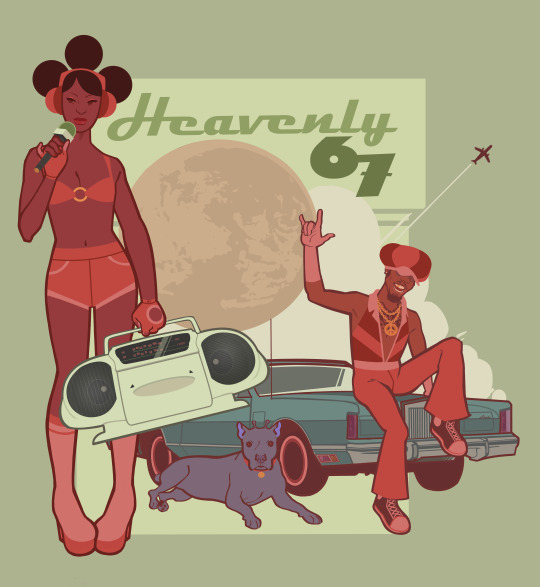
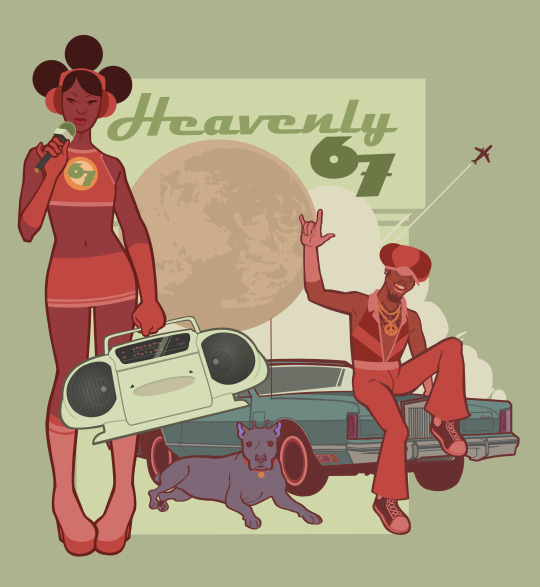

Take a ride and fly high with Heavenly 67~🛩
#my ocs#ljart#60s#ill put this in my shops soon so if youd like to help support a struggling art student maybe buy a print🥺if u want<3#graphic art#wait fuvk moons too bright lemme reupload an edit
1K notes
·
View notes
Text







#Poor Buck#Someone come save him#We need air support here#By air support I mean Buck is struggling to breathe because of the panic and Gerrard is squeezing too hard#Tommy should come give him some mouth-to-mouth#bucktommy#tommy kinard#evan buckley#911 spoilers#tevan#kinley#vincent gerrard
1K notes
·
View notes
Text



how to say "I love you" in x-files [137/?] ⤷ 2.11 — "Excelsis Dei"
#not scully flat out ignoring the girl who’s actually struggling#and asking about mulder who is clearly supporting her#she’s so me#tw flashing gif#txf ily#em.txf#my gifs#the x files#txfedit#dailytxf#msr#msredit#useremsi#useralf#usernessa#singinprincess#usereerie#usernooshin#userveronika#userteresa#I want queue believe
254 notes
·
View notes
Text
A reminder that Glinda having either dyslexia/dysgraphia or a learning disability is canon in the Movieverse.
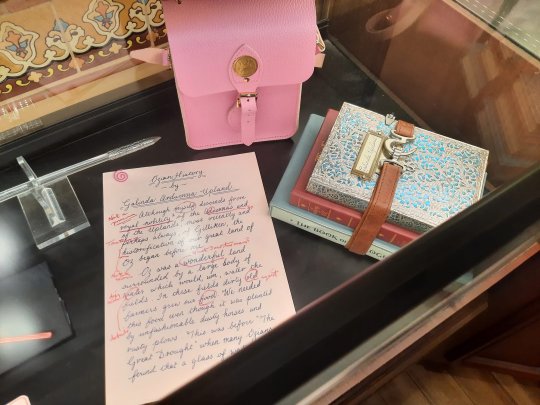
This is the same paper that we see her get back in this scene, in which we can see this was a large essay too.
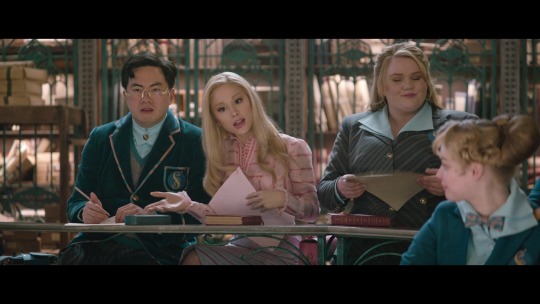
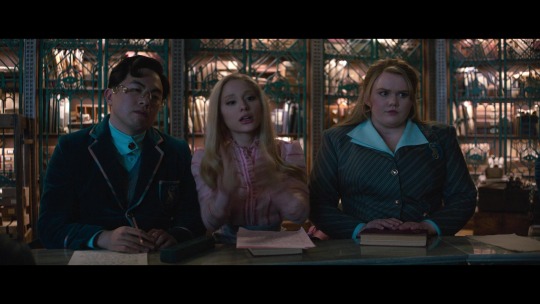
There's nothing rushed to her handwriting, this was not an essay done at the last minute, and still, it shows several signs of a learning disability and/or dysgraphia.
Misspells her name in the second line
Wrong and inconsistent pronoun usage
Her margin spacing is consistent with someone who can't do proper syllable division
Immature transcription (see: writes her "um"s)
Limited vocabulary
Shows signs of: difficulty expressing ideas in writing, having a limited vocabulary, mispronouncing words or using a wrong word that sounds similar, and having trouble organizing what she wants to say. Those are all symptoms of a learning disability.
Less of a checklist sign, but her handwriting is very round and careful, while still not being consistently sized (see unfashionable). This and the margin sizes are very common in kids with bad dysgraphia who are made to take rigorous calligraphy courses to "fix the problem". Courses that work on the visual without remedying its underlying issues and causes. Form over content if you will.
Looking at this very blatant sign that she has a learning disability and immediately defaulting to calling her names (yes calling her stupid and saying Elphaba is a moronsexual for this counts), asking how she got into Shiz, or defending Dillamond in doing the very first thing teachers are told NOT to do with disabled students (re: calling attention to it in front of the entire class) is ableist!
#i got psychic damage seeing the replies to this pic by the wicked twitter page#and i'm making it everyone else's problem#Glinda was visibly struggling with even the concept of that class and a teacher's job is to provide guidance and support not judgement#learning disability#galinda upland#glinda upland#my beautiful princess with a disorder#there's so much to the read of neurodivergent glinda in this movie#one day i will do a full one on the autism TM#and on the basis for NPD glinda#wicked#Glinda is one of the most fascinating characters i've ever seen#she's my baby#i will defend her with my life
348 notes
·
View notes